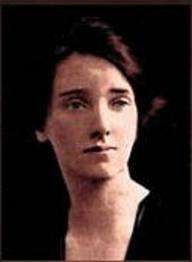Dorothy Macardle
| Dorothy Macardle | |
|---|---|
 Portrait of Dorothy Macardle | |
| Born |
2 February 1889 Dundalk, Ireland |
| Died |
23 December 1958 (aged 69) Drogheda, Ireland |
| Occupation | Historian, Novelist, Playwright |
Dorothy Macardle (2 February 1889 in Dundalk – 23 December 1958 in Drogheda)[1] was an Irish writer, novelist, playwright, and non-academic historian. Her book, The Irish Republic, is one of the more frequently cited narrative accounts of the Irish War of Independence and its aftermath, particularly for its exposition of the anti-treaty viewpoint.
Youth
Dorothy Macardle (alternatively spelt McArdle) was born in Dundalk, Ireland in 1889 into a wealthy brewing family, famous for their Macardle's Ale, and was raised Roman Catholic.[1] She received her secondary education in Alexandra College, Dublin – a school under the management of the Church of Ireland – and later attended University College, Dublin. Upon graduating, she returned to teach English at Alexandra.
Nationalist
Macardle was a member of the Gaelic League and later joined Cumann na mBan in 1917. In 1918 (during the War of Independence), Macardle was arrested by the RIC while teaching at Alexandra; she was eventually dismissed in 1923, towards the latter end of the Irish Civil War, because of her anti-Treatyite sympathies and activities.[1]
When the republican movement split in 1921–22 over the Anglo-Irish Treaty, MacArdle sided with Éamon de Valera and the anti-Treaty Irregulars. She was imprisoned by the fledgling Free State government in 1922, during the Civil War, and served time in both Mountjoy and Kilmainham Gaols.
While working as a journalist with the League of Nations in the 1930s she acquired a considerable affinity with the plight of pre-war Czechoslovakia. Consequently, she differed with official Irish government policy on the threat of Nazism, Irish neutrality during World War II, compulsory Irish language teaching in schools, and deplored what she saw as the reduced status of women in the 1937 Constitution of Ireland.[2]
Author
MacArdle recounted her Civil War experiences in Earthbound: Nine Stories of Ireland (1924). MacArdle became a playwright in the next two decades. In her dramatic writing she used the pseudonym Margaret Callan. During this time she worked as a journalist at the League of Nations.
She also researched her mammoth book The Irish Republic which was first published in 1937. Her political opponents and some modern historians consider her to be a hagiographer for de Valera's political views. Murray considers that: "..de Valera’s ambitious scheme was eventually implemented by Dorothy MacArdle, his devoted follower and lifelong apologist, whose book The Irish Republic conforms closely to the overall plan outlined by de Valera in prison, and even incorporates many of its details. The outline originally proposed by de Valera was extremely detailed, incorporating a carefully planned chronology and headings from which the chapters were to be developed."[3]
She died in 1958 at the age of 69 of cancer in hospital in Drogheda. Though she was somewhat disillusioned with the new Irish State (in particular, regarding its treatment of women), she left the royalties from The Irish Republic to her close friend Éamon de Valera, who wrote the foreword to the book. De Valera visited her when she was dying.[4]
Published works
- Tragedies of Kerry, 1922–23
- Earthbound: Nine Stories of Ireland, 1924
- The Irish Republic (published 1937, 1938, 1951, 1968 and subsequently)
- Uneasy Freehold (1941, basis for the 1944 movie The Uninvited), published in the US as The Uninvited (1942)
- The Unforeseen (1946) (novel set in Ireland) American title of Fantastic Summer (1946)
- Without Fanfares: Some Reflections on the Republic of Ireland (1947)
- Children of Europe: a study of the children of liberated countries; their war-time experiences, their reactions, and their needs, with a note on Germany (1949)
- The Dark Enchantment (1953) (a novel set in Provence)
- Shakespeare, Man and Boy (published posthumously in 1961
References
- 1 2 3 Luke Gibbons, The Irish Times, Weekend Review, "A Cosmopolitan Reclaimed: A Review of Dorothy MacArdle: A Life", by Nadia Clare Smith, 10 November 2007, p.13
- ↑ Irishman's diary 2008; retrieved December 2009
- ↑ Essay by P.Murray, RIA 2001
- ↑ De Valera, by Tim Pat Coogan, p 500